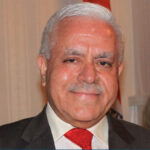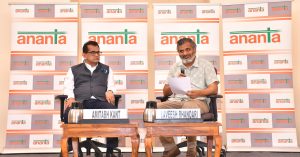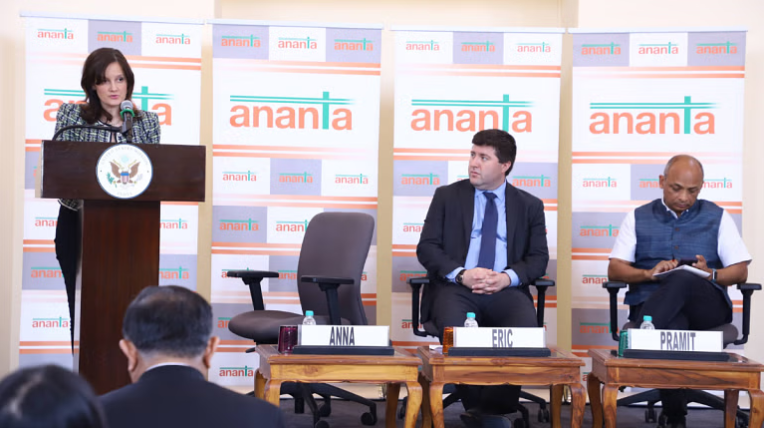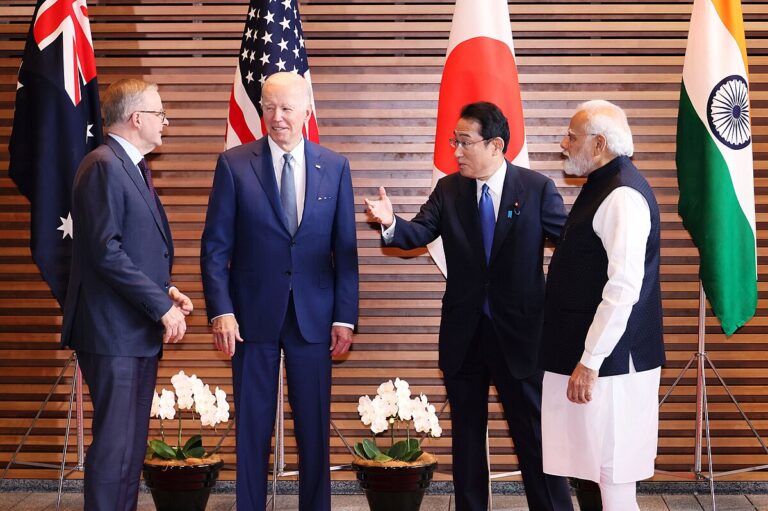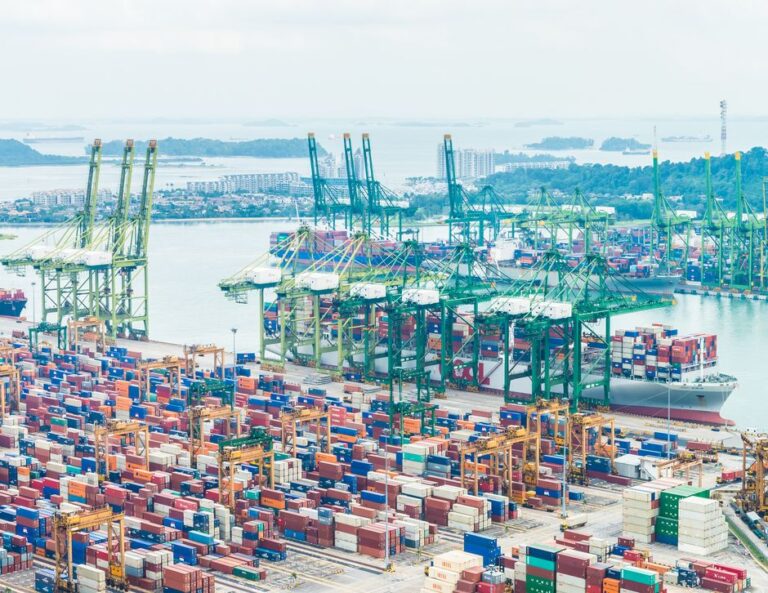Political Developments
The meeting of the Council of Foreign Ministers of the Shanghai Cooperation Organization (SCO) ended in Astana with the adoption of 22 decisions related to multilateral cooperation in political and diplomatic, trade and economic, and cultural-humanitarian spheres. The meeting was held with participation of all member and observer states, partners and the UN Secretary General.
Addressing the foreign ministers of the SCO countries at their annual meeting, the Kazakh President said that Kazakhstan is making every effort to enhance the potential of SCO during its chairmanship. He noted significant projects nearing completion, such as the Spiritual Sanctuaries project, and the declaration of 2024 as the SCO Year of Environment on Kazakhstan’s initiative. He emphasized ongoing preparations for additional events in energy, transport, and culture, and underscored the importance of the upcoming Astana SCO summit. Tokayev said that Kazakhstan proposed to develop the SCO Initiative ‘’On World Unity for Just Peace and Harmony.’’ The adoption of this document, as well as the SCO Astana Declaration during the upcoming summit, will contribute to the consolidation of international efforts to resolve conflicts in various regions of the world. Tokayev called for further steps to reform the SCO. He outlined Kazakhstan’s balanced proposals for transforming the SCO into an effective multilateral cooperation mechanism. The President also touched upon cyber security issues, placing emphasis on early identification of cyber threats. Addressing the situation in Afghanistan, he stressed the need to prevent a humanitarian crisis and create conditions for long-term stabilization. He reiterated the importance of Kazakhstan’s initiative to establish the United Nations’ Regional Center for Sustainable Development Goals for Central Asia and Afghanistan in Almaty.
Pakistan’s Deputy Prime Minister and Foreign Minister said at the Shanghai Cooperation Organisation (SCO) meeting that the Taliban must adhere to the principle of inclusive politics and respect for all Afghans’ rights. He said that the contact group for Afghanistan should be revived within the SCO to create a platform for practical cooperation. The first meeting of the SCO Afghanistan contact group was held in 2021. Pakistan called on the Taliban to prevent terrorist groups from operating in Afghanistan and the interim government of Afghanistan should take tangible and effective measures to ensure that Afghanistan’s territory is not used against any country for terrorism.
One of the primary goals of this meeting was to thoroughly prepare and outline the agenda for the upcoming Astana Summit. The heads of the SCO member countries are likely to sign more than 20 economic and security documents at their summit in Astana on July 3-4. A list of topics and documents to be presented for consideration by the member states’ leaders was approved. This includes the draft Astana Declaration by the heads of the SCO member states, the SCO Initiatives on World Unity for Just Peace and Harmony, the Roadmap for enhancing cooperation with SCO dialogue partners, and several others.
Special emphasis was placed on the expansion of the Organisation, underscoring the appeal and positive reputation of the SCO among other nations and international partnership bodies. Since assuming the chairmanship of the SCO in July 2023, Kazakhstan has coordinated over 180 events spanning diverse sectors. The meeting participants also addressed the holding of the SCO Council of Heads of Government (Prime Ministers) Meeting, scheduled for autumn 2024 in Islamabad.
Kazakh President Tokayev visited Singapore in his first official visit to the country since becoming head of state in 2019. The visit reciprocated former Singapore president’s visit to Kazakhstan in May 2023. Both countries welcomed stronger connectivity and people-to-people ties, including through education, cultural exchanges and tourism. Singapore expressed its keen interest in Kazakhstan’s early ratification of the bilateral Services and Investment Agreement under the Eurasian Economic Union-Singapore Free Trade Agreement, which would promote greater economic engagement between the two countries. The leaders discussed ways to deepen bilateral cooperation, including in areas of education, food security, green energy and digitalisation. Singapore encouraged Kazakh companies to use it as a gateway to engage Southeast Asia and vice versa. Singapore welcomed Air Astana’s plans to launch direct flights to Singapore. The leaders signed six agreements in the areas of economic cooperation, higher education, intellectual property rights protection, legal cooperation, security cooperation, and standards. Bilateral trade in goods grew 46.3 per cent year on year to $603.1 million in 2023, while trade in services grew 172.9 per cent year on year to $67.4 million in 2022. Singapore’s direct investments in Kazakhstan stood at $960 million in 2022, while Kazakhstan’s investments in Singapore topped $1.3 billion.
Malaysian PM Anwar’s official visit to the Kyrgyz Republic, Kazakhstan and Uzbekistan yielded positive results in economic and political cooperation. Malaysian PM emphasised efforts to increase trade involving larger Malaysian exports. During the visit to Kazakhstan, agreement was reached to continue strengthening ties and exploring new areas of cooperation. Malaysian PM who is also the Finance Minister said that in his meeting with the Kazakh President, discussions on increasing cooperation between the two countries, covering sectors such as trade, investment, higher education, tourism, and the halal industry took place. Four memoranda of understanding (MoU) were signed which are expected to generate exports of RM1.6 billion (US$350 million). Kazakhstan agreed to provide opportunities to Malaysian companies to explore opportunities in various fields including mining and renewable energy. Malaysian PM said Kazakhstan wanted to strengthen cooperation, including knowledge sharing because Malaysia has expertise and skills in chip manufacturing. Kazakh PM highlighted the goal of unlocking the existing potential of both economies and exceeding the pre-pandemic mutual trade level of $650 million. He called on Malaysian businesses to jointly explore new opportunities to strengthen partnerships in the services sector, manufacturing, finance, education, subsoil use, agriculture, and construction. Currently, 48 companies with Malaysian capital operate in Kazakhstan, with 17 joint investment projects exceeding $410 million in progress. Malaysia’s total trade with Kazakhstan in 2023 stood at RM474.5 million (US$104.2 million) with RM465.6 million (US$102.2 million) being exports of Malaysian goods to Kazakhstan and RM8.9 million (US$1.9 million) being the value of imports from Kazakhstan.
Uzbekistan expressed its intention to establish itself as a centre for Islamic studies, particularly in the field of Hadith, since the country is the birthplace of prominent hadith scholars Imam Bukhari and Imam Tirmidhi. Malaysian PM used the opportunity to visit several locations associated with Islamic history and civilisation which are being promoted as tourist attractions. During his visit, PM Anwar also visited Samarkand and Bukhara.
Kazakhstan hosted the first meeting of Security Council secretaries from the five Central Asian states. In his opening address, Kazakh President announced that the aim of the meeting was to provide an effective platform for the collaborative prevention of external and internal challenges and threats, and to develop necessary response measures. He noted the steady growth of trade and economic cooperation between the Central Asian countries and stated that over the past five years, intraregional trade had risen by 80 percent to exceed $10 billion. He stressed that large regional projects not only bring tangible mutual benefits, but also change the configuration of the Central Asian economy. The development of transport and logistics potential is becoming a new reference point for the rapid development of the region. Cultural and humanitarian ties have also intensified, contributing to further strengthening of ties between the Central Asian states. Focussing on the fight against international extremism and terrorism, drug trafficking, and arms trafficking, Tokayev said that Afghanistan must be the focus of their common attention. He stated that one of the strategic tasks at present was the active involvement of Afghanistan in regional ties. He underlined the urgency to create a UN Regional Center for Sustainable Development Goals for Central Asia and Afghanistan in Kazakhstan. He expressed satisfaction with the growing regional cooperation and mutual trust. He added that the situation in Central Asia was moving towards sustainable development.
The Crocus City Hall terrorist attack has led to a rise in Russian xenophobia against Central Asians and a strong crackdown on Central Asian migrants from the Kremlin. Labor migrants from Central Asia make up a majority of Russia’s migrant labor market, and inaction against the growing harassment and xenophobia is being noticed by the Central Asian governments. In the aftermath of the Crocus City Hall terrorist attack, the Russian government has responded with a sweeping crackdown on Central Asian migrants. Labor migrants from Central Asia are subject to lengthy checks before being allowed into the country or turned away upon being found ineligible. Those already residing within Russia face heightened scrutiny and surveillance. Russia is not in a position to lose any more allies, and if they continue to allow the harassment of Central Asian migrants, Moscow runs the risk of alienating the region. Russian Foreign Minister attempted to downplay such treatment describing the situation on the border as “temporary” and emphasizing “that the measures taken are not directed against a specific nation or religion.” The Tajik foreign minister however asserted that citizens of Tajikistan were specifically targeted and that the negative treatment of Tajik citizens and the violation of their rights do not “correspond with the principles of bilateral relations.” Tajik citizens are bearing the brunt of these actions. Kyrgyz officials have been particularly blunt compared to other Central Asian countries when describing the treatment of their citizens by Russian law enforcement officials. Some Kyrgyz lawmakers including Kyrgyz foreign minister raised concerns that their citizens were facing difficulties entering Russia due to xenophobia and increased mistreatment by law enforcement bodies.
For almost ten days Turkmenistan’s capital Ashgabat was flooded with rain, in the worst downpours since the 1970s. The rain caused significant damage to the city’s infrastructure. Mudflows hit the cities and in many areas electricity and part of the rail network was shut down. However, there were no reports in Turkmen media about the rains and the damage they caused. Turkmen law enforcement agencies took unprecedented measures to prevent photos and videos of the downpours from appearing on social networks. A Turkmenabad police officer, on condition of anonymity, said: “We have been ordered to prevent the leakage of defamatory photos and videos abroad. It was explained to us that if defamatory information gets into the hands of the West or the U.S. State Department, this information can be used to destabilize the domestic situation.”
President of Kazakhstan Tokayev and Chair of the Grand National Assembly of Türkiye Numan Kurtulmuş discussed strengthening the expanded strategic partnership during a meeting in Astana. Tokayev expressed great appreciation for the possibilities of parliamentary diplomacy and noted the significance of Kurtulmuş’s visit. He said that Türkiye is one of the five largest trading partners and 10 major investors of Kazakhstan. Last year, bilateral trade reached $6 billion. However, according to Tokayev, mutual trade turnover can reach $10 billion in the future. Kurtulmuş said that the two countries have great potential for expanding ties in trade, technology, industry, logistics, energy and agriculture.
It was announced that Pakistan and Turkmenistan will independently finance the multibillion-dollar TAPI pipeline project. In the wake of the international community’s decision to not recognize the Taliban government in Afghanistan even after 3 years, foreign funding has stalled.
Economic Developments
Kazakhstan announced it will step up investments in the production of rare earth metals. Under its new “Comprehensive Plan for the Development of the Rare and Rare Earths Metals Industry for 2024-2028,” the country aims to increase investment by 40%, significantly improving production value. Rare earth mineral production already plays a significant role in Kazakhstan’s foreign and economic policies, as the country hopes to cooperate with both the U.S. and EU on this front. Uzbekistan seems to have similar plans. It recently launched a slew of rare earth mining projects worth approximately US$ 500 million which will add more critical raw materials like tellurium, molybdenum, and graphite to the supply chain. Like Kazakhstan, Uzbekistan wants to use rare earths to enhance its relationship with the EU. Recently, it inked a Memorandum of Understanding with the EU aimed at guaranteeing a varied and sustainable supply of critical raw materials to support the global shift towards green energy.
Kazakhstan and Uzbekistan sit on large stockpiles of rare earth elements, which are crucial for industrial use and the development of digital technologies and clean energy solutions. Kazakhstan, for its part, has about 15 rare earth mineral deposits. Uzbekistan sits on the second-largest reserves of CRMs in the region. This will not only help Uzbekistan’s own economic growth, but also provide stiff competition to China.
An increase in offshore exploration for rare earths by other nations could soon erode China’s position as the world’s primary rare earth mineral supplier. Incoming data showed a slowing down of rare earths exports from China to other parts of the world starting in 2020. According to a report by the U.S. Geological Survey, China’s share of total RE exports dropped from about 90% a decade ago to approximately 70% in 2022. Other countries have since filled up this supply chain gap.
The United States Agency for International Development (USAID) launched the 13th Central Asia Trade Forum (CATF) titled “Trade Connections: Bridging Globally.” It is one of the region’s flagship trade events advancing connectivity, commerce, and trade policy. More than 300 business executives and government officials from Asia, Europe, the Middle East, the United Kingdom, and the United States met in Almaty, Kazakhstan to learn how to advance trade in Central Asia.
The volume of Kazakhstan’s uranium transportation via the Trans-Caspian International Transport Route (TITR)/Middle Corridor increased by 4.5% in 2023 compared to the previous year. Starting in 2018, Kazatomprom national atomic company has been supplying uranium products through Azerbaijan using TITR. In 2023, for the first time, shipments worth 308 tons were made through Azerbaijan to the United States. Last year, 2,300 tons of uranium were transported through Azerbaijan to France, Canada, Romania, India and the US. In 2023, some 21,112 tons of uranium were mined in Kazakhstan. As of beginning of 2023, proven reserves of uranium are estimated at 990,000 tons in Kazakhstan. Consideration of feasibility to construct a uranium conversion plant will take place after the Ulba Metallurgical Plant’s refining production begins commercial operation in 2026. Cost of uranium conversion services and the state of the market will be the decisive factors.
Uzbekistan became the third largest foreign investor in Kazakhstan, overtaking China in the number of registered companies. As of May 1, there are 4,595 Uzbek companies registered in Kazakhstan. This is an increase of 706 companies since the beginning of the year. In contrast, Chinese companies, which previously held the third position, increased their presence by only 204 enterprises. Turkey ranks second, and Russia holds the first position in terms of foreign investment in Kazakhstan. It was earlier reported that Azerbaijan entered the top 10 countries with registered and operating companies in Kazakhstan.
Kazakhstan secured the 52nd position in the World Economic Forum’s 2024 Travel and Tourism (T&T) Development Index, marking an ascent of six places since 2019. These rankings reveal Kazakhstan’s steady progress in the global travel and tourism landscape. With a score of 4.07 out of 7, Kazakhstan has demonstrated its commitment to enhancing its tourism infrastructure and offerings, contributing to its rise in the rankings.
Speaking at the 4th Central Asian Conference of the Valdai International Discussion Club, Russian Deputy Foreign Minister emphasized Russia’s role as a reliable and key trading and economic partner for the Central Asian region. His remarks underscored the consistent growth in trade turnover, reaffirming Russia’s continuing significant economic influence in the area. He noted that the total volume of trade turnover between Russia and Central Asian countries exceeded $44 bn last year, with Russia accounting for one-third of Central Asia’s foreign trade turnover. He further highlighted the substantial role of national currencies in mutual settlements between Russia and Central Asian nations noting that share of mutual settlements of Russia with Kazakhstan, Kyrgyzstan, and Tajikistan in national currencies reached 80%. Share of such settlements between Russia and Uzbekistan was 55%, and between Russia and Turkmenistan, 24%. In addition to trade, Moscow alone provides employment to over 600,000 citizens from Central Asian countries. The absence of visa barriers, with the exception of Turkmenistan, the presence of a special regulatory framework, and the prevalence of the Russian language in the region makes the Russian labor market extremely attractive for citizens of Central Asian countries going abroad for work.
Kyrgyzstan’s trade deficit with China totalled $4.141 billion in the first quarter of 2024 indicating that Kyrgyzstan has an unhealthy dependence on China. Russia, once the dominant economic power in Central Asia, now lags behind China in bilateral trade with Kyrgyzstan. Chinese exports to Kyrgyzstan totalled $4.163 billion, while only $22 million of Kyrgyz goods and services made their way to China during the reporting period. There are few means at Kyrgyzstan’s disposal to address the trade imbalance. Kyrgyzstan’s Agriculture Ministry agreed to ship 10,000 tons of cherries to China this year. But the value of those exports will hardly make a dent in Kyrgyzstan’s trade deficit with Beijing.
According to a latest report by the European Bank for Reconstruction and Development (EBRD), Central Asian economies in 2024 are expected to see growth slowing to 5.4 per cent. However, a rebound to 5.9 per cent is expected in 2025. Kazakhstan’s economy is slated to expand by 5.5 per cent in 2025 despite a temporary slowdown in 2024. Uzbekistan’s GDP is expected to grow by 6.5 per cent in 2024 and 6.0 per cent in 2025. The report notes that trade with Russia, which had been a significant growth contributor for many Central Asian economies in 2023, has now reached a plateau. Severe floods that hit Kazakhstan will negatively impact its growth in the short term but the region’s outlook for both 2024 and 2025 remained positive. Over the last two years, the region has seen a sizeable increase in publicly and privately financed investment in transport, logistics and export-oriented manufacturing capacities. Robust growth in wages and real incomes, coupled with a surge in international arrivals and tourism, fuelled a consumption boom, further supported by technological advances in consumer lending. Intra-regional trade, investment and tourism continued to rise, assisted by much-improved regional cooperation on common challenges ranging from water and energy shortages to transport and border management bottlenecks. Inflation receded to single-digit levels in all countries in line with broader global trends, allowing central banks in most Central Asian states to reprioritise growth and start softening their monetary policy stances.
From January to April, 2024, KazTransOil, national oil transporter delivered 420,000 tons of Kazakh oil to Germany, which is 330,000 tons more compared to the same period last year. Last year, German direct investment in Kazakhstan grew 64% to a record high of $770 million. Speaking with the Chair of the Board of the Eastern Committee of the German Economy, Kazakh President classified Germany as a strategic partner of Kazakhstan in the European Union. Speaking of cooperation in the agricultural sector, Kazakh President recalled his proposal to establish a Regional Center for Sustainable Agriculture, which will contribute to using Kazakhstan’s agricultural potential more effectively, fostering the adoption of innovative technologies and their commercialization.
India-Central Asia Relations
India was represented in the SCO Foreign Ministers Meeting in Astana, Kazakhstan by Dammu Ravi, Secretary (Economic Relations) in the Ministry of External Affairs. Stating that connectivity is crucial for the progress of any region, India said that it is essential to uphold the basic principles of the SCO charter and respect the sovereignty and territorial integrity of the member states. Reiterating its strong stand against terrorism, India also stressed that the SCO member states must unite in the fight against terrorism and there should be no place for “double standards.” He added that New Delhi has focused on five pillars of cooperation in the SCO – Science and Technology, Startups and Innovation, Traditional Medicine, Shared Buddhist Heritage, and Youth Empowerment. Raising concern on the situation in Afghanistan, Dammu Ravi said it directly impacted the regional security, and affirmed that SCO nations must come together to strive for the well-being of the people of Afghanistan. He said that the situation in Afghanistan had directly impacted the security of all SCO countries. They must come together to strive for the well-being of the people of Afghanistan. It was important that Afghanistan’s territory is not used to spread instability in the region or to encourage extremist ideologies.” Dammu Ravi stressed that reform and modernization of SCO was one of the most important agendas before the bloc. It is imperative that English is given the status of one of the SCO official and working languages to not only enhance the efficiency of the Organization but also its stature in the international arena. India would be happy to assist in capacity building programmes for English language, through India’s reputed Indian Technical and Economic Cooperation (ITEC) courses. The meeting discussed preparations for the upcoming Summit of the SCO Council of Heads of State on 3-4 July, 2024 in Astana, reviewed ongoing cooperation in SCO, and exchanged ideas on regional and global developments of common concern.
Ministers of culture representing member states of the SCO held their 21st meeting via videoconference. The participants exchanged views on cooperation opportunities among SCO member states on cultural affairs, including in the context of the intergovernmental agreement between SCO member states to promote cultural cooperation. The heads of delegations agreed to continue forging stronger ties and sharing their best practices on cultural matters. They also supported the idea of submitting joint applications for listing cultural monuments in SCO member states as UNESCO World Heritage sites. Additionally, they discussed efforts to combat trafficking of cultural artefacts and promote expert exchanges.
India and Iran signed a 10-year agreement that provided for Indian operations at the Chabahar port for the next 10 years. India said a “narrow view” should not be taken on the long-term agreement between New Delhi and Tehran on the Chabahar port project as it would benefit landlocked Afghanistan, Central Asia and the entire region. These remarks came days after the United States warned of sanctions following India and Iran sealing the deal. India said that its commitment towards the Chabahar port is to realise its potential as a connectivity hub for Afghanistan and Central Asian countries, which are landlocked. India provided humanitarian assistance, including 85,000 metric tons of wheat, 200 metric tons of pulses and 40,000 litres of pesticide Malathion, to Afghanistan through Chabahar.
Recent news about attacks and threats by some locals in Bishkek, capital of Kyrgyzstan on foreign students from Egypt, Pakistan, India and Bangladesh came both as a surprise and shock to the governments and student communities of these countries. The immediate provocation appeared to have been a skirmish between some Egyptian students and locals which apparently went out of control. Indian students have been safely and successfully pursuing higher studies, particularly in the field of medicine, in Universities in Central Asia since the disintegration of the Soviet Union in 1991, principally because it is extremely difficult to get admission to Indian Medical Universities and Colleges, as also on account of the affordable tuition fees in Central Asian countries. Reportedly approximately 17,000 Indian students are currently studying in Kyrgyzstan. The situation was quickly restored to normal. No Indian student was hurt. Indian students were advised to stay indoors and exercise care and caution. Kyrgyzstan is determined to provide adequate security to foreign students to restore their confidence and morale. This is beneficial for Kyrgyzstan also as it one of the poorest countries in Central Asia and gets to earn huge sums of hard currency from the foreign students pursuing higher studies in its Universities.
At the recently concluded India-Central Asia Business Conclave in Pune, the focus was on the prospects of cooperation within the framework of the Eurasian Economic Union (EAEU) and India. The conference served as a platform for discussing the advancement of trade and economic collaboration among the nations of Central and South Asia. Key topics included exploring avenues for enhancing bilateral trade relations and fostering economic partnerships. Representatives from diplomatic missions of Azerbaijan, Armenia, Belarus, Georgia, Iran, Kazakhstan, Kyrgyzstan, Mongolia, Uzbekistan, Tajikistan and Turkmenistan participated. During the one day meet, the delegates exchanged insights, explored potential areas of synergy, and charted a course for future cooperation. The conference aimed to stimulate economic growth, enhance regional connectivity, and promote stability in the region.
India is gearing up to initiate negotiations for a free trade agreement (FTA) with the Eurasian Economic Union (EAEU). The move aims to bolster trade relations between the two regions, potentially unlocking new economic opportunities. Russia, Armenia, Belarus, Kazakhstan, and Kyrgyzstan form the EAEU. Recently, ahead of formal negotiations, both India and the EAEU exchanged trade data, laying the groundwork for discussions. The forthcoming negotiations between India and the EAEU underscore a strategic effort to strengthen economic ties and explore avenues for mutual growth.
Uzbekistan hosted the 3rd Tashkent International Investment Forum (TIIF) which served as a pivotal platform for fostering global dialogue and exchanging investment best practices. With over 2,500 participants from 93 countries, including high-profile dignitaries and leaders from various nations, the forum showcased Uzbekistan’s robust investment appeal and underscored its commitment to attracting foreign investments, including from India. The potential for collaboration extends beyond economic spheres to encompass cultural and tourist exchanges, which can bolster social and economic development and strengthen the foundation of bilateral relations.
Of particular significance is the cooperation in the transport and logistics sector, which plays a vital role in facilitating trade between India and Uzbekistan. Uzbekistan’s exploration of utilizing the Chabahar port for exports, supported by Indian investment, presents an opportunity to streamline trade routes and reduce costs. Negotiations are underway to operationalize this initiative, reflecting the mutual commitment to enhancing trade ties.
India, with its burgeoning industries and educational institutions, has made significant inroads into Uzbekistan, with notable investments in pharmaceuticals, manufacturing, and IT infrastructure. The establishment of joint ventures and collaboration in various sectors underscores the depth of bilateral engagement between the two countries. The value of bilateral trade between India and Uzbekistan has reached USD 700 million and is on an upward trajectory. Both countries are optimistic about further expanding trade ties, with the aim of surpassing the USD 1 billion mark shortly. The diversity of goods traded between the two nations, ranging from pharmaceuticals to machinery components, highlights the breadth of their economic partnership.
An Uzbekistan court has initiated criminal case against an Indian businessman who has been charged and is wanted in connection with the deaths of 68 children and the disability of 16 others in Uzbekistan. The case revolves around the distribution of two drugs, “Dok-1 Max” and “Ambronol,” which have been linked to the fatalities. During the court proceedings, lawyer Ulugbek Latipov called for an additional forensic chemical examination of the drug samples. Latipov emphasized that the initial court had overlooked crucial evidence. Specifically, the presence of harmful substances, ethylene glycol and diethylene glycol, in the drugs was detected by the “State Center for Expertise and Standardization of Medicines, Medical Products and Medical Equipment” laboratory at the end of December 2022. However, the methods used for these tests were not clearly outlined, and it was revealed that non-standard test methods were employed due to the emergency situation.
The previous issues of Central Asia Digest are available here: LINK



